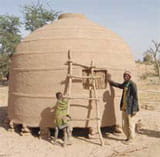The economy of Niger relies mainly on agriculture. However, over the last 30 years, drought and environmental problems have led to poor harvests. Poor people have little to eat between harvests, which have caused them to leave their fields in order to earn money, or to move away from rural areas altogether.
Local church members realised that emergency aid is not a good solution to the food security problems because it keeps communities dependent on outsiders. They therefore decided to help their communities to establish community grain banks. This was done with the help of the development and relief department of UEEPN (Union des Églises Évangéliques Protestantes du Niger). These banks build up a stock of grain to meet basic food needs between harvests, especially if the harvest has been poor or prices have risen too high.
Setting up the grain banks
To increase community ownership, UEEPN ensured the following:
- The communities could choose grain banks as a solution to their problems.
- Communities received training about maintaining and managing grain banks.
- Community members participated, such as by helping to construct the grain bank.
- Women and children actively participated in the work.
- The local church, as a motivator within the community, was involved in every stage of setting up a grain bank.
The work involved a number of stakeholders:
- Community members, who were responsible for setting up a management committee, protecting the grain from theft and pests, selling grain at moderate prices and investing income in a bank account.
- Representatives from the local churches, who monitored the use of the grain banks.
- UEEPN staff, who organised an information and awareness-raising campaign and trained the members of the management committee.
- The local authorities, who monitored the quality of operations of the grain banks by ensuring that the sales and loans systems worked efficiently and that the regulations were respected.
- Donors, who funded the stocks of grain for the first year of the project.
Operating the grain banks
Once the grain banks were constructed, stocks of grain were provided for the first year of operation. The community decided which system they would like to use to obtain the grain between harvests. There are two main systems, both of which are managed by the management committee.
The loan system One sack of grain is loaned to each family, which is then repaid after harvest, along with interest and a fee for running costs. The decisions about interest and fees are made by the General Assembly of the village.
The sales system The General Assembly fixes the price of grain according to the market price, which can be determined from the cost of buying the initial stocks. Each person is allowed to buy a specific amount of grain. The income is invested by the management committee in a savings account with a bank or co-operative.
The aim is that after six years, each grain bank will double its stock so that a new grain bank can be set up in another community.
Results
Some of the grain banks have not been successful. This was mainly due to grain banks not being a priority in the village or poor management. In some cases women were poorly represented on management committees and committee members were non-literate and therefore did not keep good records. Good training and support for management committees is therefore essential. However, in many communities grain banks have been successful in ensuring food security between harvests. As they have access to food, community members are able to work in their own fields rather than going to work elsewhere for cash. The price of food is regulated and the capacities of community members have been strengthened. As the local church has been involved throughout, attitudes towards the local church have improved.
Abdoul-Azize Sarki is a Programme Officer for the development and relief department of UEEPN.
BP 2630, Niamey, Niger.
Email: [email protected]









